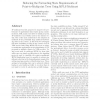Free Online Productivity Tools
i2Speak
i2Symbol
i2OCR
iTex2Img
iWeb2Print
iWeb2Shot
i2Type
iPdf2Split
iPdf2Merge
i2Bopomofo
i2Arabic
i2Style
i2Image
i2PDF
iLatex2Rtf
Sci2ools
ISCC
2005
IEEE
2005
IEEE
Reducing the Forwarding State Requirements of Point-to-Multipoint Trees Using MPLS Multicast
IP multicast was first proposed to improve the performance of applications that require group communications. Still, many years after its initial proposal, IP multicast is not widely used in the Internet today. One of the main roadblocks to the adoption of multicast is the potentially large multicast forwarding state in the routers. In this work we investigate this state scalability problem in the context of an IP VPN service built using MPLS. We focus on pointto-multipoint applications such as distribution of TV programs to multiple clients of a VPN provider. Using recent work on multicast MPLS, we show that with some very simple modifications to the signaling protocols used to establish the point-to-multipoint MPLS distribution trees it is possible to achieve significant reduction in the forwarding state required for setting up a large number of distribution trees. These savings in forwarding state can be achieved without having to send multicast traffic to receivers that do not ...
Related Content
| Added | 25 Jun 2010 |
| Updated | 25 Jun 2010 |
| Type | Conference |
| Year | 2005 |
| Where | ISCC |
| Authors | George Apostolopoulos, Ioana Ciurea |
Comments (0)

